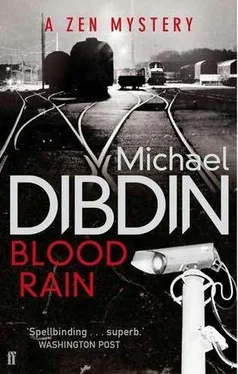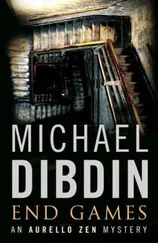Michael Dibdin - Blood rain
Здесь есть возможность читать онлайн «Michael Dibdin - Blood rain» весь текст электронной книги совершенно бесплатно (целиком полную версию без сокращений). В некоторых случаях можно слушать аудио, скачать через торрент в формате fb2 и присутствует краткое содержание. Жанр: Полицейский детектив, на английском языке. Описание произведения, (предисловие) а так же отзывы посетителей доступны на портале библиотеки ЛибКат.
- Название:Blood rain
- Автор:
- Жанр:
- Год:неизвестен
- ISBN:нет данных
- Рейтинг книги:3 / 5. Голосов: 1
-
Избранное:Добавить в избранное
- Отзывы:
-
Ваша оценка:
- 60
- 1
- 2
- 3
- 4
- 5
Blood rain: краткое содержание, описание и аннотация
Предлагаем к чтению аннотацию, описание, краткое содержание или предисловие (зависит от того, что написал сам автор книги «Blood rain»). Если вы не нашли необходимую информацию о книге — напишите в комментариях, мы постараемся отыскать её.
Blood rain — читать онлайн бесплатно полную книгу (весь текст) целиком
Ниже представлен текст книги, разбитый по страницам. Система сохранения места последней прочитанной страницы, позволяет с удобством читать онлайн бесплатно книгу «Blood rain», без необходимости каждый раз заново искать на чём Вы остановились. Поставьте закладку, и сможете в любой момент перейти на страницу, на которой закончили чтение.
Интервал:
Закладка:
‘What happens after that?’
‘I don’t need to know, so I wasn’t told. One more thing. If these people find out that you’re a policeman, you’re dead meat. Understand?’
‘Only too well.’
‘All right, that’s it. Good luck, Aurelio. If you make it, give me a call as soon as you arrive. I’ve been missing you, you old shit. I don’t want anything to happen to you now you’ve finally got over our little misunderstanding.’
‘I’ve missed you too, Gilberto. I’ll try not to do anything stupid and I’ll call as soon as I can. Meanwhile, thanks for everything.’
It was only when he saw the tiny single-engined aeroplane that Zen realized that flying back to Sicily was going to mean…well, flying. He had been so preoccupied with other problems in the hours leading up to this moment that this basic point had completely failed to register. The moment it did, he also realized that the state of comatose indifference induced by the news of his mother’s imminent death, which had protected him through the turbulent flight to Rome, was no longer operative. He was sane again, and the only sane way to look at flying was to be utterly terrified.
‘What happens if the propeller falls off?’ he asked in a tone of forced jocularity as they taxied to the end of the baked-earth runway.
‘It won’t.’
‘But suppose you have a heart attack or something?’
The pilot stroked his black moustache.
‘Well, we’ll be flying low, to keep off the radar screens, so you’ll have about fifteen seconds to put your worldly and spiritual affairs in order. Not enough, probably’
A moment later, the plane was lined up, the pilot pulled back the throttle, and all talk became impossible.
By then it was past eleven o’clock at night. Zen had spent most of the intervening hours locked up in a stuffy apartment whose windows were covered by exterior grooved metal shutters which he had been strictly ordered not to open.
Shortly after half-past six, he had gone down to the reception of his hotel, settled the bill and ascertained that the bar Piju was no more than a ten-minute walk away. He then seated himself in a corner of the lounge from where he had a clear view of the entrance and lobby. If the ROS men did come looking for him, there was just a chance that he would be able to slip out while they were upstairs hammering on the door of his room.
In the event, no one came in except couples, evidently tourists, but he was still nervous about showing himself on the street. There was nothing to be done, however, and after studying a map of Valletta displayed in the lobby and determining his route, he pushed open the glass door and turned sharp left down a narrow, steeply inclined alley. It had occurred to him that the telephone line of Gilberto’s Sardinian friends might be under surveillance, and possibly that of the hotel as well. Of course, ‘they’ could grab him at the bar if they wanted to, but it had also occurred to him that they might prefer not to act so publicly. He had therefore located the steps where the bar was situated on the map, and then planned an alternative way to get there. This was not difficult, since the city was built on a grid plan.
And a very handsome city it was too, he thought, as he made his way along St Mark Street and turned left on to a long straight paved thoroughfare swooping downhill and then up again like a carnival ride. The buildings to either side were of pleasant proportions, the architecture sober and restrained, the material a golden sandstone which glowed in the late-afternoon sunlight like warmed honey. The balconies were enclosed with wooden walls painted green or left bare, which made a charming contrast with the stonework. There could hardly have been a more complete contrast with the tortuous baroque excesses of Catania, executed in the black solidified lava which had so many times overwhelmed the city. Although he was hundreds of kilometres south of Sicily, almost half-way to Africa, Zen felt quite at home with this form of urban planning, where all was calm, functional and restful.
At the bottom of the street he turned left and then immediately right, and walked up the steps to the bar. It was a small, poky place, obviously designed to appeal to a circle of regulars and to repel anyone else. Zen strode up to the bar and ran through his ritual exchange with the owner, whose jolly, tubby physique was belied by a pair of startlingly direct black eyes. Once their dialogue was completed, the man served Zen the beer, picked up the phone and spoke a few phrases in the guttural false-Italian of the island.
It was another half hour before his contact showed up. At first, Zen paid him no attention. Various people, all men, had come in and gone out while he waited, and this skinny, pimply, gangly youth seemed an unlikely candidate for a mission of this presumed importance. It was only later that Zen realized that this had been precisely the point. They were not yet sure of Zen, so they had left him to stew while they checked the comings and goings in the neighbourhood. Then, once they felt reasonably sure that he had come alone, they’d sent this expendable kid to make the first approach, just in case they were wrong.
The owner of the bar had appeared to speak, or at least be able to pronounce, some Italian, but the youth gave no sign of having any use for language at all. He appeared at Zen’s side, standing close enough in the uncrowded bar to draw attention to himself, then jerked his head sharply back and to one side and walked out. Zen duly followed. Under the circumstances, he didn’t bother paying for his beer. They could take it out of the five million.
They walked down through a warren of steps and alleys to a dock on the waterfront, where they boarded a small ferry. During the crossing to the other shore of the harbour inlet, the youth closely inspected each of the other half dozen passengers, but made no eye contact with Zen and still did not speak. When they disembarked after the short crossing, he took up a pose of stoic resignation near the top of the gangplank and remained there until all the other passengers had dispersed. Then he gave Zen another of his violent head gestures, like someone slinging water out of a bucket, and crossed the street to a blue Renault saloon. He opened the passenger door for Zen, who noted that the car had been left unlocked. Either Malta was an incredibly crime-free country, or these people enjoyed a level of respect which made such routine security precautions unnecessary.
They drove at what seemed to Zen a remarkably sober and steady pace — considering that his chauffeur was not only about twenty-two, but presumably also a gang member — up a wide street leading from the harbour to a sprawling development of apartment blocks with a vaguely Arab air: clusters of white cubes of different heights and sizes all jammed together in apparent disorder like a residential souk. The youth drew up by one of the entrances to this labyrinth, gave Zen another of his patented cranial swipes, and led him inside.
Despite the folkloristic appearance of the complex, the interior was completely modern and remarkably luxurious. They rode in a lift up to the fifth floor, where the youth opened a door — once again, unlocked — and gesturally jerked Zen through to a room to the left. He switched on the light, pointed to the shutters over the window and made a savage slicing motion with his right hand, looking Zen in the eye for the first time.
Zen nodded.
‘I won’t open them,’ he said.
The youth looked at him in astonishment, as though his dog had just given voice to a political opinion. Then he walked out, closing the door behind him. A moment later, Zen heard the lock engage.
The room was minimally furnished with a sofa, a chair and a table, all in what appeared to Zen to be execrable taste. Hiere was no telephone, radio or television, and the walls were bare. It was as neutral and impersonal as some hutch at a cut-price hotel on the autostrada.
Читать дальшеИнтервал:
Закладка:
Похожие книги на «Blood rain»
Представляем Вашему вниманию похожие книги на «Blood rain» списком для выбора. Мы отобрали схожую по названию и смыслу литературу в надежде предоставить читателям больше вариантов отыскать новые, интересные, ещё непрочитанные произведения.
Обсуждение, отзывы о книге «Blood rain» и просто собственные мнения читателей. Оставьте ваши комментарии, напишите, что Вы думаете о произведении, его смысле или главных героях. Укажите что конкретно понравилось, а что нет, и почему Вы так считаете.











